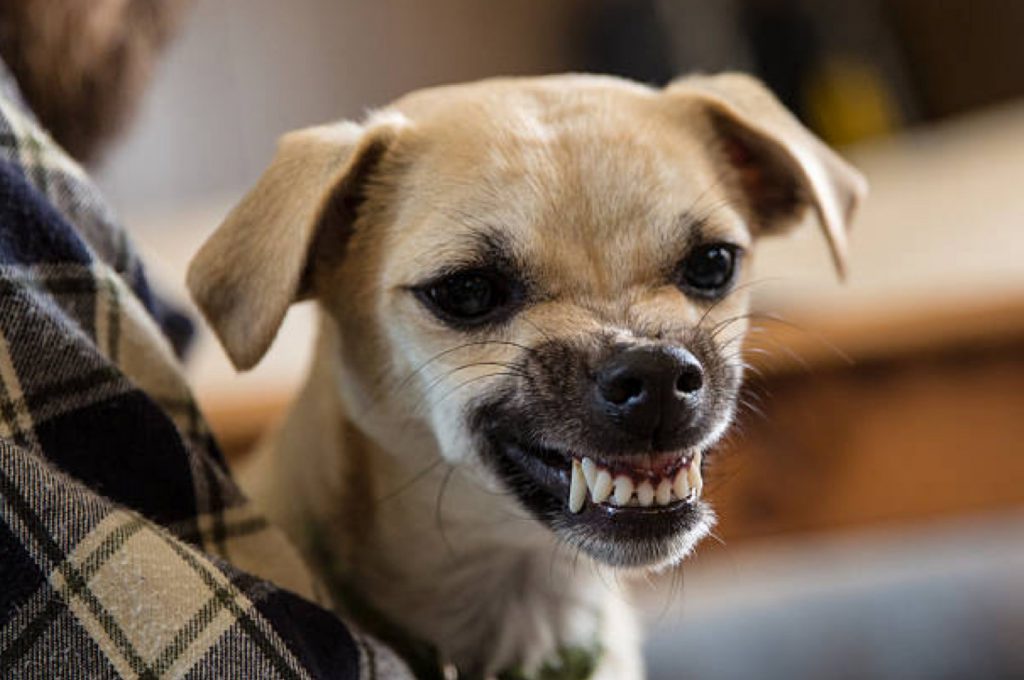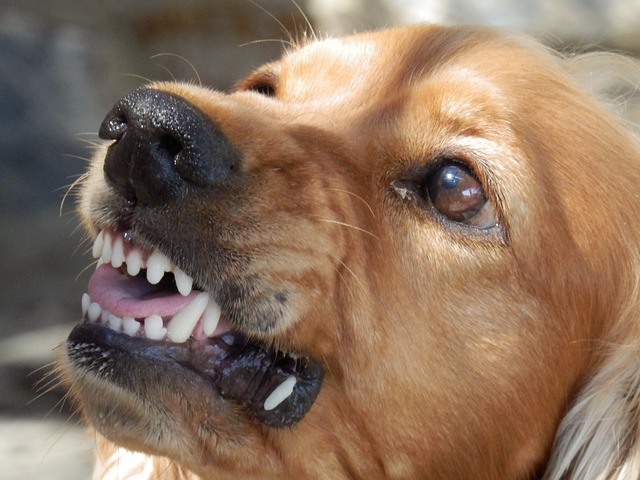Sharing a home with a dog comes with a lot of perks.
Dogs provide companionship, amuse, and enrich our lives in many ways, so the decision to live with a dog that is aggressive towards you but not your husband cannot be taken lightly.
Under normal circumstances, dogs exhibit a sense of family and always want to see members of their families happy.
When they now start being aggressive towards one member of the family, then it could be a sign of a deeper problem.
It is even more worrying if the dog is usually docile and friendly but suddenly becomes aggressive to you but not your husband.
In extreme cases, the dog might even bite you while he knows you so well and has never acted against you before.
So, what should you do when you notice that your dog is aggressive towards you but not your husband?
Since dog aggression can sometimes get out of hand and lead to injuries, it is vital to find the cause so that you can help the dog overcome this hostile behavior.
Potential Reasons Why Your Dog May Be Aggressive Towards You but Not Your Husband

There are several reasons why a dog may act aggressively towards one family member over another.
If you have been living with the dog since puppyhood, it might be easier to figure out the root cause of the problem, but if it is a dog that you adopted, the cause may be a bit complex to understand.
Nonetheless, here are potential reasons why a dog may display such behaviors:
Fear
Fear is one of the most common reasons why a dog may be aggressive towards people or other dogs.
A dog will exhibit fear-based aggressive behavior if he perceives danger and needs to protect himself.
Fear-based aggression is caused by a lot of factors, including lack of proper socialization, abuse by previous owners, or past negative experiences with other people or other dogs.
Genetics may also affect a dog’s ability to tolerate the unexpected. Some dog breeds tend to be more skittish than others.
Rat terriers, for instance, are more anxious while Labradors tend to be more accommodative and easy-going.
So, it could be that the dog feels safer with your husband than with you.
Perhaps you are a bit unpredictable compared to your husband or you always do something that triggers fear or anxiety in the dog.
Perhaps you are not good at reading your dog’s body language as your husband and often provoke him unknowingly.
Remember that when a dog is in fear, he will growl or become aggressive at anyone—even children.
Resource Guarding
Resource guarding or possession aggression occurs when a dog is possessive of something—toys, water, food, or any object of value.
Dogs become aggressive to ward off humans and other animals away from any resource that they value.
Your dog may be resource guarding your husband. He may be feeling anxious when you come close to his priced resource (your husband).
When you distract your husband, the dog probably feels that his resource is threatened.
Past Experiences
Dogs have an impeccable ability to associate things like looks, smells, or signals to past experiences, traumas, rewards, and events.
If a dog has been to a vet’s office before, he may act terrified to go inside in your next visit because he associates going into the vet office with a terrible experience (getting shots, for instance).
So, your dog may also be aggressive towards you—and not your husband—because:
- You resemble someone he has had a bad experience with in the past.
- You smell like someone or something that has traumatized his life in the past.
- You display certain language that someone displayed before something bad happened to him.
Related Post: Will My Dog Forgive Me for Hitting Him?
Poor Socialization
Aggressive behaviors in dogs may also be caused by lack of socialization.
If you adopted the dog as an adult, inadequate socialization may play a big role in many of his fearful behaviors.
For instance, the dog might have never been socialized to someone who wears a wig.
You probably wear wigs or have worn one some time back, and your dog has now associated it with something scary.
In other words, a dog that’s not socialized with all sorts of women’s dressings and accessories could act aggressively if he sees something new or different.
Jealousy
According to this 2014 study by study by Christine Harris and Caroline Prouvost, dogs also get jealous.
Whether it is the type of jealously that human experience or an offshoot of ingrained dog behavioral issues like redirected excitement or resource guarding, dogs have been proven to feel some form of envy.
So, think of your dog’s behavior as something that a jealous kid would do—he may favor one person in the family (your husband) over the other (you).
Related Post: 10 Most Jealous Dog Breeds
Sibling Rivalry
Sometimes a dog may view a member of the family as siblings in a litter where there’s always competition for family resources (mostly the mother).
Considering that your dog is part of your family, this might justify some of the cases of jealousy.
In case your dog sees your husband as a parent figure and you as a sibling, his aggressiveness could be due to sibling rivalry.
Marking territory
Your dog could also be simply marking his territory.
When it growls at you or becomes aggressive towards you in any way, maybe he thinks that you don’t belong in that particular space—whether it is a spot on the couch, car, on the bed, or any area.
What Can You Do To Prevent Your Dog From Being Selectively Aggressive Towards You?

Now that you understand some of the reasons why your dog is aggressive towards you and not your husband, what can you do?
Well, preventing a bite should be your priority.
In most cases, bites come without warning or when you least expect it, but the following are some crucial tips that you can leverage to control the behavior:
Bond with the dog
One of the top reasons why your dog may be aggressive towards you is simply because he feels safe and closer to your husband than you.
You can change this by taking your time to bond with the dog.
One of the best ways to get the dog to bond with you fast is to feed him whenever you are around.
Consider hand-feeding the dog or holding the bowl when he is eating as this is more intimate.
At other times, take the duty of walking your dog to strengthen your bond further.
You can also allow the dog to lie on your chest because dogs love this too.
In addition, work with him on a few commands he already knows and reward him accordingly with treats so that he not only learns to respect but also appreciate you.
This isn’t a forever strategy but it is necessary as long as the dog takes to love you and avoid being selectively aggressive towards you.
The idea is to help your dog associate you with positive experiences.
Change your approach
Consider changing your approach to something that he anticipates instead of something he dislikes.
For instance, don’t try to remove him when he is sleeping beside your husband, sleeping on the couch, or resting on your husband’s lap.
Instead, toss some of his favorite treats on the floor when you want him to get off the couch or your husband’s lap. This will counter-condition his emotional response to your approach.
It is also important to be consistent with your behaviors around the dog.
When your activities or routines are predictable, the dog will feel less anxious and more at ease with you the same way he is with your husband.
Be Firm
When the dog is showing aggressive behavior towards you, he should be made aware that such behaviors are not acceptable.
To this end, both you and your husband need to reprimand him to change his behavior.
For instance, you and your husband should consider reprimanding and then isolating him for some time for him to cool off a bit.
Doing this repeatedly will send a message to your pup that he is not allowed to misbehave this way.
Seek Professional Help
If your dog has never shown aggressive behavior towards you before but all of a sudden begins to snarl or growl at you (without being provoked or threatened), it may be time to pay a visit to your local vet.
Your vet will perform a number of tests to establish if your dog is exhibiting any underlying condition.
Remember to give as many details about your dog as possible, including whether your pup is showing any signs of illnesses or if you’ve recently changed his diet.
Your vet may also check anxiety and socialization issues by asking you a few questions related to these issues.
Take things slowly
Forcing any relationship with your dog may fracture any trust that you had built.
So, while implementing some of the tips we have highlighted, strive not to force things.
Move the dog at his pace. If he stops playing with you, consider playtime over.
Like in humans, boundaries are just as important, so learn to respect them.
Conclusion
When your dog is aggressive towards you but not your husband, don’t take it personally.
It is the only way he can tell you that something about you is making him nervous or uncomfortable.
And it is not a conscious decision but an emotional reaction with complex underpinnings.
Nonetheless, it can be remedied by implementing some of the tips we’ve highlighted above and consulting with your vet or a professional trainer.
Related Posts:
Why Is My Dog Aggressive When I’m On My Period?
Why Does My Dog Bite Me When Excited?
Why Don’t Dogs Use Litter Boxes?
Why Is My Dog Throwing Up Undigested Food Hours After Eating?
As an Amazon Associate, we may receive a small commission from qualifying purchases but at no extra cost to you. Learn more. Amazon and the Amazon logo are trademarks of Amazon.com, Inc, or its affiliates.

